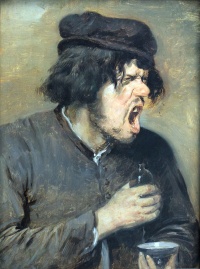Bad
From The Art and Popular Culture Encyclopedia
| Revision as of 18:20, 11 December 2013 Jahsonic (Talk | contribs) ← Previous diff |
Revision as of 18:21, 11 December 2013 Jahsonic (Talk | contribs) Next diff → |
||
| Line 25: | Line 25: | ||
| From Old High German ''bad'', akin to Old Saxon ''bath'', belongs to the German word family of ''bähen''. | From Old High German ''bad'', akin to Old Saxon ''bath'', belongs to the German word family of ''bähen''. | ||
| == Related == | == Related == | ||
| - | [[bad girl|bad girl and boy trope]] - [[bad film]]s - [[bad reputation]] - [[bad taste]] - [[bad luck]] - [[evil]] - [[negative]] - [[pejorative]] | + | *[[bad girl|bad girl and boy trope]] - [[bad film]]s - [[bad reputation]] - [[bad taste]] - [[bad luck]] - [[evil]] - [[negative]] - [[pejorative]] |
| == Contrast with == | == Contrast with == | ||
| - | [[good]] | + | *[[good]] |
| ==See also== | ==See also== | ||
| *[[Kakos]] | *[[Kakos]] | ||
Revision as of 18:21, 11 December 2013
|
Related e |
|
Featured: |
Bad is a concept in ethics used to describe undesirable circumstances or events.
Though bad often is used to imply moral turpitude of a person, the term more specifically refers to an unfortunate circumstance. Likewise, bad is often used as a synonym for evil, but can also refer to something flawed or unusable.
Contents |
In Nietzsche
The philosopher Friedrich Nietzsche made much of a distinction he drew in German between the böse, ("evil"), which he was prepared to admire, and the schlecht ("bad"), which he disdained; in Nietzsche's thought, evil was powerful, menacing, and dangerous; bad was weak and ineffective.
In African American Vernacular English
In African American Vernacular English, and varieties of American English that have been influenced by it, bad or badass are frequently used as compliments, an example of rhetorical irony.
- You is [sic] bad, man!
- Also Bek is "bad" at Madden.
In this sense bad is a synonym for fantastic and it is used in the same context aswicked in British vernacular and American vernacular.
Etymology
From Old High German bad, akin to Old Saxon bath, belongs to the German word family of bähen.
Related
- bad girl and boy trope - bad films - bad reputation - bad taste - bad luck - evil - negative - pejorative
Contrast with
See also
- Kakos
- Unpleasant
- Bad man
- Bad woman
- Good and bad
- Bad (economics), a concept in economics which is used to describe an object or situation that is harmful to the persons affected by it, in contrast to a good
- Andy Warhol's Bad

.jpg)




